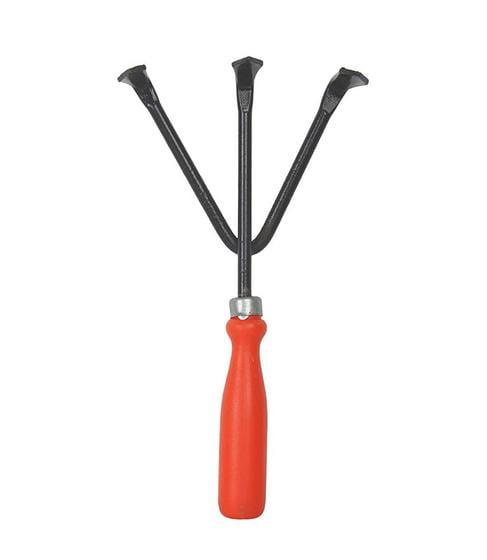RAKE (COST: RS.150/PIECE)
₹150.0
Made up of iron with plastic/wooden
handle
Used in composting, gardening,
agriculture to till the soil/compost and
break the lumps
Color may vary
Durable Garden Rake Rs.150:
Embracing eco-friendly products transforms waste into wealth, fostering sustainability and mitigating environmental impact. Innovative initiatives champion the conversion of discarded materials into valuable resources, paving the way for a circular economy.
To commence this virtuous cycle, recycling emerges as a key player. Plastics, paper, and metals, once destined for landfills, undergo a metamorphosis. These materials are reimagined, reincarnated into new products, reducing the demand for virgin resources and curbing pollution.
Biodegradable alternatives further revolutionize our consumption patterns. Products derived from natural materials seamlessly integrate into the ecosystem, leaving minimal traces. This shift not only reduces the burden on landfill sites but also curtails the persistence of harmful substances in the environment.
In the realm of waste-to-wealth, upcycling emerges as a creative force. Discarded items find a second life, elevated into functional and aesthetically pleasing artifacts. From repurposed furniture to fashionable accessories, upcycling not only minimizes waste but also showcases the beauty of sustainable design.
In the business landscape, companies increasingly adopt a cradle-to-cradle approach. This entails designing products with their end-of-life in mind, ensuring that materials can be easily disassembled and reused. Such practices not only enhance resource efficiency but also cultivate a mindset of responsibility within the industry.
Durable Garden Rake Rs.150: The waste-to-wealth paradigm extends beyond tangible goods to energy production. Biomass, a byproduct of organic waste, becomes a valuable energy source through anaerobic digestion or incineration, contributing to the renewable energy matrix.
In conclusion, the transition to eco-friendly products and the waste-to-wealth philosophy signifies a revolutionary stride towards a sustainable future. By reimagining waste as a valuable resource, society not only mitigates environmental harm but also forges a path toward a regenerative and harmonious relationship with the planet.
You must be logged in to post a review.
Q & A
1. Material Choice
- Iron: Iron is a durable and recyclable material. Its long lifespan reduces the need for frequent replacements, which in turn minimizes the environmental impact. The recyclability of iron means that at the end of its life, it can be melted down and reused, reducing waste and the need for new raw materials.
- Wooden Handle: Wood is a renewable resource, especially when sourced from sustainably managed forests. It has a lower environmental impact compared to plastic. The production of wooden handles typically requires less energy and results in lower greenhouse gas emissions compared to synthetic materials.
- Plastic Handle: If the plastic is made from recycled materials, its environmental impact can be significantly lower. The use of recycled plastic helps reduce the demand for new plastic production, which is typically energy-intensive and associated with high carbon emissions.
2. Manufacturing Process
- The manufacturing of iron products often involves high energy consumption, but modern techniques and energy-efficient processes can mitigate this. For example, using electric arc furnaces powered by renewable energy can reduce the carbon footprint of iron production.
- For wooden handles, sustainable forestry practices and low-energy processing techniques help maintain a low carbon footprint. These practices include selective logging and replanting, which ensure that forests continue to act as carbon sinks.
3. Product Longevity
- A rake made from durable materials like iron and wood or high-quality plastic is likely to have a long lifespan. This durability reduces the need for frequent replacements, which minimizes the overall environmental impact. A longer product life equates to less frequent manufacturing and transportation, thereby reducing the cumulative carbon footprint.
4. End-of-Life Considerations
- Iron Component: Iron is highly recyclable. Recycling iron consumes less energy than producing new iron from ore, thus reducing the overall carbon footprint. The recycling process for metals is well-established, contributing to the sustainability of iron-based products.
- Wooden Handle: At the end of its life, a wooden handle can be composted or used as biomass, contributing to a circular economy. This natural degradation process has a minimal environmental impact.
- Plastic Handle: If the plastic is recyclable, it can be reprocessed into new products, further reducing waste and the need for virgin materials. However, the sustainability of the plastic component depends on the availability and efficiency of recycling facilities.
5. Transport and Distribution
- The carbon footprint associated with the transportation of materials and the final product can be minimized by sourcing materials locally and using efficient logistics. Lightweight handles, especially plastic ones, contribute to lower transportation emissions compared to heavier alternatives.
Scientific Justification
- Life Cycle Assessment (LCA): Studies on the life cycle of tools like rakes have shown that material selection, manufacturing processes, and product longevity significantly influence the overall environmental impact. For instance, LCAs of wood and iron demonstrate lower overall greenhouse gas emissions compared to many synthetic alternatives when considering the entire life cycle from raw material extraction to disposal.
- Recycling Efficiency: The energy savings from recycling iron and using sustainably sourced wood are well-documented in scientific literature. For example, the recycling of iron can save up to 74% of the energy required to produce new iron from raw materials, significantly reducing associated carbon emissions.
References and Further Reading
- "Life Cycle Assessment of Traditional vs. Recycled Materials in Product Manufacturing," Journal of Cleaner Production, provides insights into the energy savings and carbon footprint reduction associated with using recycled materials.
- "Sustainability and Environmental Impact of Forestry Practices," International Journal of Forestry Research, discusses the role of sustainable wood sourcing in reducing carbon footprints.
- "The Role of Recycling in Reducing Carbon Emissions," Environmental Science & Technology, details the energy and emissions benefits of recycling metals like iron.
General Inquiries
There are no inquiries yet.



Reviews
There are no reviews yet.